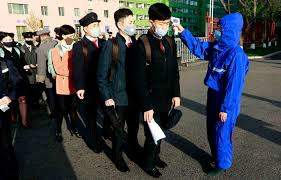A defector’s message: We’re taking our eyes off the ball in North Korea

North Korea is making news again. For weeks there have been growing signs that the country is struggling to cope with the covid-19 pandemic. And now we’re hearing rumors that supreme leader Kim Jong Un has undergone heart surgery.
Needless to say, it’s always hard to know how seriously to take any accounts coming from the world’s most isolated country. Yet this time there is one striking bit of information that we do know: Kim didn’t show up for the ceremonies marking the birthday of his grandfather and regime founder Kim Il Sung on April 15 — a major absence, since that’s the most important day in the national calendar.
“For days now, South Korean newspapers and world media have been reporting that something is wrong with Kim’s health,” former North Korean diplomat Thae Yong-ho told me this week. Normally, he said, the regime would be quick to denounce the rumors — but so far Pyongyang has been silent. Thae’s conclusion: “Something strange is going on.”
Thae is uniquely qualified to comment on the workings of the North Korean regime. He was once a full-fledged member of the North Korean establishment. He served the regime for many years as a diplomat, including during a stint in London, where he once helped Kim Jong Un’s brother attend an Eric Clapton concert. In August 2016, he and his family defected.
And this month he made history by getting elected to parliament in South Korea — the first former North Korean to win a direct vote to the national assembly (rather than winning a seat through a party list).
He said he hopes that his victory will send a vital message to the North about the openness of South Korean democracy. “I strongly believe the two Koreas, North and South, must be reunited peacefully,” he told me. “The only way to achieve peaceful reunification is to win not only the hearts of ordinary North Koreans but also of the elite. To do that the South must show that there is a peaceful exit for them.” North Korean media constantly hammer away at the idea that officials in Russia and other post-communist states experienced impoverishment and persecution after the collapse of Marxism-Leninism. Thae said that his successful election campaign — which, he believes, was followed by many of the roughly 100,000 North Koreans living in China and Russia, where they can access news via smartphones — offers an antidote to the propaganda.
That’s vital, Thae said, precisely because of the latent instability of a regime based on one-man rule. He concedes that there’s no particular reason to think the North Korean system will collapse anytime soon. But the same was true of the Soviet Union and its satellites, which looked equally impregnable — until they weren’t.
And when that day comes for the North, as it ultimately will, the rest of the world will need to be ready. But Thae said he worries that the United States, in particular, is taking its eye off the ball. If the current regime suddenly collapses, the United States and its regional partners — including China and Russia, as well as our allies in Seoul and Tokyo — will need to act fast to secure the North’s nuclear arsenal and prevent general chaos.
That requires contingency planning, Thae noted. But right now Washington and Beijing seem more concerned about trading insults than conferring quietly about how to manage the North Korean powder keg. Meanwhile, the Trump administration’s demands that Seoul pay more for the stationing of U.S. troops in the South are bedeviling the two countries’ relationship to the detriment of other issues — such as the fate of Kim Jong Un.
Yet this is precisely the moment to be paying close attention to events in the North. Earlier this week, Thae said, foreigners living in Pyongyang noticed a sudden spate of panic buying among local residents, whether due to pandemic fears or continuing rumors about a leadership vacuum. Recently, several of Kim Jong Un’s relatives — notably his sister, Kim Yo Jong — have achieved unaccustomed prominence, prompting speculation about succession planning.
Given that it’s North Korea we’re talking about, no one should be surprised if Kim Jong Un were to suddenly reappear as if nothing is amiss, leaving the country to go back to business as usual. It has happened before.
Yet considering the number of variables in play, wouldn’t it be better if we — and countries in the region — were prepared for the worst? When it comes to North Korea, what we don’t know can definitely hurt us.
Photo: Students wearing masks have their temperatures checked Wednesday as a precaution against coronavirus as Kim Chaek University of Technology in Pyongyang reopened. (Jon Chol Jin/AP)











